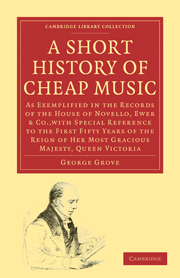 A Short History of Cheap Music
A Short History of Cheap Music “Train'd in music.”
—Pericles, Act iv., Sc. 1.IN the year 1837, when Queen Victoria ascended the throne of her ancestors, music was not in the most flourishing or happy condition.
A long period of neglect had deprived native art of that freedom which is essential to an active and progressive exercise. The chief exponents of the divine science—not then, be it said, fully admitted to the privileges it should enjoy as a science, for it was not freely acknowledged as such—were alternately petted or despised, according as their services were required, or their occasional attempts to assert their position as citizens obtruded upon the notice of the leaders of society. The love for music was general, and widely spread among all classes. The actual knowledge of its principles and practice was limited in amount, and restricted to a very few. The practice of music in private life was rare, and its cultivation in the domestic circle somewhat apologetic. The chief show piece on the pianoforte was still the “Battle of Prague,” or “The Linnet Waltz,” written “by somebody and dedicated to everybody.” Music was not cultivated for its own sake, but for some relative association. The flute was a favourite instrument with gentlemen who desired to be thought musical, because it was convenient and portable, and suited well with the dismal bearing affected by those with a turn for romance. Byron, be it remembered, was the favourite poet. Some young ladies practised the guitar as a genteel kind of instrument. Others preferred the harp, especially those with elegant hands, arms, and feet. Duets and trios were constructed upon an ingenious plan.
To save this book to your Kindle, first ensure [email protected] is added to your Approved Personal Document E-mail List under your Personal Document Settings on the Manage Your Content and Devices page of your Amazon account. Then enter the ‘name’ part of your Kindle email address below. Find out more about saving to your Kindle.
Note you can select to save to either the @free.kindle.com or @kindle.com variations. ‘@free.kindle.com’ emails are free but can only be saved to your device when it is connected to wi-fi. ‘@kindle.com’ emails can be delivered even when you are not connected to wi-fi, but note that service fees apply.
Find out more about the Kindle Personal Document Service.
To save content items to your account, please confirm that you agree to abide by our usage policies. If this is the first time you use this feature, you will be asked to authorise Cambridge Core to connect with your account. Find out more about saving content to Dropbox.
To save content items to your account, please confirm that you agree to abide by our usage policies. If this is the first time you use this feature, you will be asked to authorise Cambridge Core to connect with your account. Find out more about saving content to Google Drive.